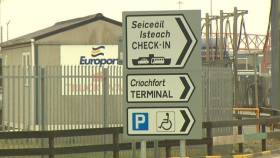Displaying items by tag: DirectEU links
#Ports&Shipping - The European Commission has drawn up proposals for developing maritime links between Ireland and continental Europe as part of contingency plans for a possible 'no deal' Brexit outcome.
As RTE News reports, Sinn Féin MEP Liadh Ní Riada has seen an internal document which details a series of "planned European Commission proposals" for "Brexit preparedness".
They deal with changes in a wide range of areas such as banking, imposing tariffs, energy efficiency, medicine, visa and transport.
Among the proposals is a plan to design a new maritime route to link Ireland and the continental part of the North Sea-Mediterranean corridor.
Speaking to RTÉ at the European Parliament in Strasbourg, Ms Ní Riada said: "It’s very reassuring and positive for us to see this document. It is coming from the Secretary General of the Commission, Martin Selmayr, and it outlines the need to create a maritime channel, or a bridge, metaphorically speaking, from Ireland to the rest of Europe."
She believes the plan could see investment in existing Irish ports through the Connecting Europe Facility, an EU fund for developing transport infrastructure.
To read more on the proposed direct maritime shipping links, click here.
























































